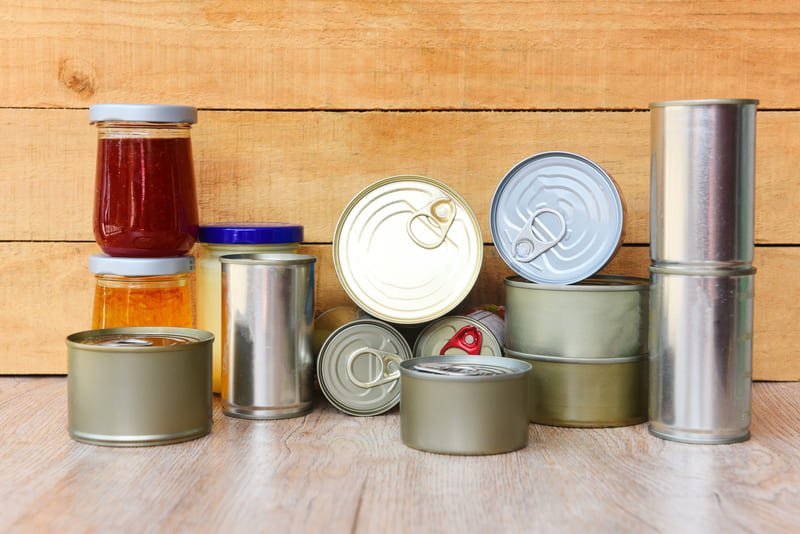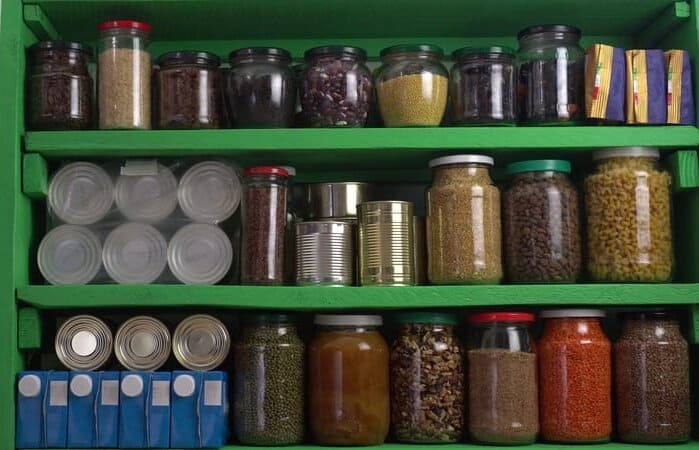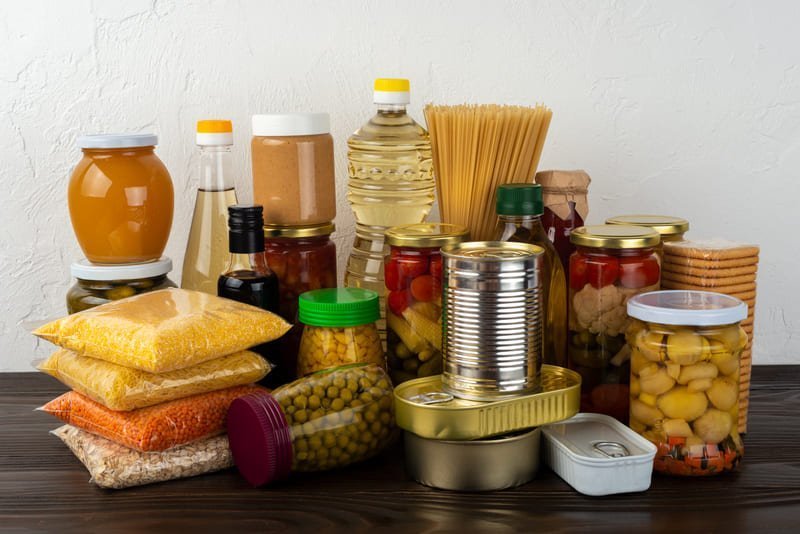When it comes to preparing for emergencies, having a well-stocked pantry with canned survival food is essential. Canned food is a convenient and reliable option for preppers as it has a long shelf life, is easy to store, and provides the necessary nutrients for survival. In this guide, we will explore the best canned survival food options for your emergency pantry, ensuring that you are prepared for any crisis that may arise.
Key Takeaways:
- Stocking your emergency pantry with canned survival food is crucial for preparedness.
- Canned food has a long shelf life, is easy to store, and provides essential nutrients.
- Include a variety of canned meats, vegetables, fruits, and grains in your emergency pantry.
- Proper storage, rotation, and regular checking of expiration dates are important for maintaining the freshness of your canned food stock.
- While canned food can supplement your diet during emergencies, a balanced diet with fresh foods is recommended for long-term health.
What Should Your Emergency Pantry Look Like?
When it comes to disaster preparedness, having an emergency pantry stocked with essential supplies is crucial. Your emergency pantry should include a variety of nutrient-rich foods that can sustain you during an emergency situation. In this section, I will provide you with a guide on what your emergency pantry should look like, including the best canned food options for disaster preparedness.
Recommended Daily Food Amounts
According to the Canned Food Alliance, the recommended daily food amounts per person during an emergency include:
- Canned meats and beans: 2-3 servings
- Vegetables: 2-3 servings
- Fruits: 2-3 servings
- Milk: 1-2 servings
- Grains: 6-8 servings
- Water: at least 1 gallon per person
It is also important to have additional non-perishable items in your pantry to provide variety and comfort during stressful times. Consider including canned chili, soup, and spaghetti, as well as condiments and comfort foods like chocolate or energy bars.
Special Considerations
When building your emergency pantry, don’t forget to plan for the specific needs of infants, individuals with special health needs, and your pets. Stock up on baby formula, baby food, medications, and pet food to ensure their well-being during an emergency.
| Emergency Pantry Checklis | ||||
|---|---|---|---|---|
| Canned meats and beans | Vegetables | Fruits | Milk | Grains |
| Canned chili | Soup | Spaghetti | Condiments | Comfort foods |
| Water (at least 1 gallon per person) | Baby formula | Baby food | Medications | Pet food |
Having a well-stocked emergency pantry ensures that you and your loved ones have access to essential food supplies during a disaster. By including a diverse range of canned food options and considering the specific needs of your family members, you can be better prepared for any emergency situation that comes your way.
The Best Canned Foods for Your Emergency Pantry
 When it comes to preparing for emergencies, having a well-stocked pantry with canned survival food is crucial. Canned food provides convenience, long-lasting shelf life, and the essential nutrients needed for survival. In this section, I will highlight some of the best canned foods to include in your emergency pantry. These options are not only delicious but also provide the necessary sustenance during challenging times.
When it comes to preparing for emergencies, having a well-stocked pantry with canned survival food is crucial. Canned food provides convenience, long-lasting shelf life, and the essential nutrients needed for survival. In this section, I will highlight some of the best canned foods to include in your emergency pantry. These options are not only delicious but also provide the necessary sustenance during challenging times.
1. Diced Tomatoes
Rich in vitamins and antioxidants, diced tomatoes are a versatile canned food that can be used in countless recipes. From pasta sauces to stews, they add flavor and nutrition to your meals.
2. Corn
Sweet and nutritious, canned corn is a great addition to your emergency pantry. It can be enjoyed on its own as a side dish or incorporated into soups, casseroles, and salads.
3. Green Beans
Green beans are a good source of fiber and vitamins. They can be easily heated and served as a nutritious side or added to stir-fries and stews.
4. Baked Beans
For a hearty meal, canned baked beans are a perfect choice. Packed with fiber and protein, they can be enjoyed on their own or as a side dish to complement other foods.
5. Tuna in Oil
Tuna in oil is a versatile and protein-packed option for your emergency pantry. It can be used in sandwiches, salads, or casseroles, providing a quick and easy source of sustenance.
6. Chili with Beans
Warm and comforting, canned chili with beans is an excellent option for emergency situations. It’s a complete meal in itself, packed with protein, fiber, and flavors that will keep you satisfied.
7. Roast Beef
Canned roast beef is a convenient protein source that can be enjoyed on its own or used in sandwiches and stews. It provides a delicious and filling option for your emergency meals.
8. Beef Stew
A hearty and flavorful choice, canned beef stew is a perfect comfort food for emergencies. Packed with tender beef, vegetables, and rich broth, it provides nourishment and warmth during challenging times.
9. Chunk Chicken Breast
Canned chunk chicken breast is a convenient source of lean protein. It can be used in salads, sandwiches, or casseroles, giving you the necessary energy to sustain yourself during emergencies.
10. Hormel Spam
Hormel Spam is a classic canned meat option that has a long shelf life. It can be fried, grilled, or added to various dishes for a savory and satisfying meal.
These canned foods are readily available at most grocery stores and provide essential nutrients, protein, and long-lasting shelf life for your emergency pantry. Incorporating a variety of them into your stockpile ensures that you are prepared for any unexpected situation that may arise.
Having a diverse selection of canned survival food ensures that you have options when it comes to meal preparation during emergencies. Now that we’ve explored the best canned foods for your emergency pantry, let’s move on to the next section where we’ll discuss how to store canned food for maximum longevity.
How to Store Canned Food for Longevity
 Proper storage is key to ensuring the longevity of your canned food. By following these guidelines, you can maintain the quality and freshness of your stock for extended periods of time.
Proper storage is key to ensuring the longevity of your canned food. By following these guidelines, you can maintain the quality and freshness of your stock for extended periods of time.
1. Choose the right location: Canned food should be stored in a cool, dry place away from direct sunlight and sources of heat. Avoid areas that are damp or humid, as the moisture can lead to rust and damage the cans.
2. Organize and rotate regularly: It is essential to keep your canned goods organized and practice the FIFO (First In, First Out) method. By placing newer cans at the back of the shelf and using the older ones first, you ensure that no cans go past their expiration date.
3. Check for damage: Before storing your canned food, inspect the cans for any signs of damage or bulging. Damaged cans may indicate spoilage or bacterial contamination, and should not be stored.
4. Avoid stacking: To prevent damage and ensure proper air circulation, avoid stacking cans too high. If you need to store a large quantity of canned food, consider using sturdy shelving or can organizers.
5. Keep an inventory: Regularly check your stock of canned food and make note of expiration dates. This will help you plan meals and ensure that you always have a fresh supply of long-lasting food on hand.
Remember, the quality and safety of your canned food depend on proper storage. By following these guidelines, you can maximize the shelf life of your canned goods and have peace of mind knowing that you have a reliable source of nourishment in case of emergencies.
“Proper storage is key to ensuring the longevity of your canned food.”
Can You Survive on Canned Food Alone?
 While it is possible to survive on canned food alone, it is not recommended as a long-term diet. Canned foods are often high in sodium and may lack essential nutrients found in fresh foods. A diet primarily consisting of canned food may lead to deficiencies in vitamins and minerals, as well as health issues related to high sodium intake. It is important to have a balanced diet that includes a variety of fresh fruits, vegetables, lean proteins, and whole grains. Canned foods can supplement your diet during emergencies but should not be the sole source of nutrition.
While it is possible to survive on canned food alone, it is not recommended as a long-term diet. Canned foods are often high in sodium and may lack essential nutrients found in fresh foods. A diet primarily consisting of canned food may lead to deficiencies in vitamins and minerals, as well as health issues related to high sodium intake. It is important to have a balanced diet that includes a variety of fresh fruits, vegetables, lean proteins, and whole grains. Canned foods can supplement your diet during emergencies but should not be the sole source of nutrition.
Food Items to Stockpile for Emergencies
 When preparing for emergencies, it’s crucial to have a well-stocked pantry that includes a variety of non-perishable food items. These items should be easy to prepare, have a long shelf life, and provide essential nutrients. In addition to canned foods, here are some other food items to consider stockpiling:
When preparing for emergencies, it’s crucial to have a well-stocked pantry that includes a variety of non-perishable food items. These items should be easy to prepare, have a long shelf life, and provide essential nutrients. In addition to canned foods, here are some other food items to consider stockpiling:
- Freeze-dried meals
- Peanut butter and other nut butter
- Dried fruits and nuts
- Whole grain crackers, bread, and pasta
- Canned soup, chili, and stews
- Rice and beans
- Powdered milk
- Comfort foods
It’s important to keep these items stored in a cool, dry place to ensure their longevity. Regularly checking for expiration dates and discarding any expired items is also vital to maintain the freshness and quality of your stockpile.
“Having a variety of non-perishable food items ensures that you can meet your nutritional needs during emergencies. Be prepared with a well-rounded selection of supplies.”
| Food Item | Benefits |
|---|---|
| Freeze-dried meals | Lightweight, long shelf life, easy to prepare |
| Peanut butter and other nut butter | High in protein and healthy fats, versatile |
| Dried fruits and nuts | Nutrient-dense, good source of energy |
| Whole grain crackers, bread, and pasta | Source of carbohydrates, easy to store |
| Canned soup, chili, and stews | Meal-ready options, comforting during emergencies |
| Rice and beans | Good source of plant-based protein and fiber |
| Powdered milk | Long shelf life, versatile for cooking and baking |
| Comfort foods | Provide psychological comfort during stressful situations |
Conclusion
In conclusion, canned survival food is an essential component of any prepper’s emergency pantry. During times of crisis, having long-lasting canned food provides a reliable source of nourishment for you and your family. The convenience of ready-to-eat canned food and its extended shelf life make it an ideal option for long-term storage.
By carefully selecting a variety of canned foods that are nutrient-rich, non-perishable, and easy to prepare, you can ensure that you are well-prepared for any emergency situation. Remember to regularly rotate your canned goods using the FIFO (First In, First Out) method and check for expiration dates to maintain the freshness and effectiveness of your stock.
Stay proactive and keep your pantry stocked with canned survival food options. Being prepared with a variety of options that meet your dietary needs will provide you with peace of mind and the ability to confidently face any unexpected events that may come your way. Stay safe and stay ready for whatever comes.
FAQ
What is canned survival food?
Canned survival food refers to specially packaged food that is intended for long-term storage and use during emergencies or disaster situations. These canned food products are designed to have a long shelf life, making them a convenient and reliable option for preppers and individuals who are preparing for potential crises.
Why is canned food important for disaster preparedness?
Canned food is important for disaster preparedness because it provides a convenient and reliable source of nutrition during emergencies. Canned food has a longer shelf life compared to fresh food and does not require refrigeration. It can be safely stored for an extended period, making it an essential part of any emergency pantry or survival kit.
What are the best canned foods to stock for emergencies?
Some of the best canned foods to stock for emergencies include diced tomatoes, corn, green beans, baked beans, tuna in oil, chili with beans, roast beef, beef stew, chunk chicken breast, and Hormel Spam. These canned foods offer a good source of protein, vitamins, and minerals, and can be easily incorporated into meals during a crisis.
How should I store canned food for longevity?
To ensure the longevity of your canned food, it is important to store them in a cool, dry place away from direct sunlight and heat sources. Avoid storing canned food in damp or humid areas, as they can cause the cans to rust or become damaged. It is also advisable to organize your canned goods and rotate them regularly using the FIFO (First In, First Out) method.
Can I survive on canned food alone?
While it is possible to survive on canned food alone, it is not recommended as a long-term diet. Canned foods are often high in sodium and may lack essential nutrients found in fresh foods. A well-balanced diet that includes a variety of fresh fruits, vegetables, lean proteins, and whole grains is important for overall health. Canned foods can be used to supplement your diet during emergencies but should not be relied upon as the sole source of nutrition.
What other food items should I stockpile for emergencies?
In addition to canned foods, other food items that you should consider stockpiling for emergencies include freeze-dried meals, peanut butter and other nut butter, dried fruits and nuts, whole grain crackers, bread, and pasta, canned soup, chili, and stews, rice and beans, powdered milk, and comfort foods. It is important to keep these items stored in a cool, dry place and regularly check for expiration dates.












